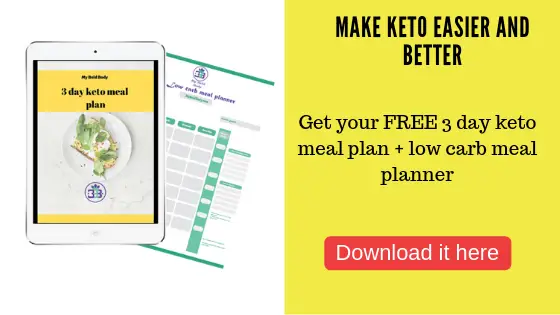This post may contain affiliate links. For more info, please read our full disclosure here
The rate of obesity has increased worldwide and people are now turning to healthier ways of eating to be able to lose weight and stay healthy.
The ketogenic diet is one of them, given that the way we eat has shown to be more effective than exercise when it comes to losing weight.
One of the many benefits of keto is weight loss, often quick and easy weight loss which is way easier to keep of if you stick to the diet.
The keto diet allows you to lose weight without having to lack essential nutrients or suffer hunger cravings as you would on many other dieting strategies.
This comprehensive guide on how to lose weight on keto shows you how weight loss works on the ketogenic diet, the things involved and how best to go about it. Here’s what will be covered in this guide
- The science behind weight loss and weight gain
- How the ketogenic diet affects how you lose weight
- What to do to lose weight on keto
- How to preserve muscle mass while burning fat on the keto diet
- The rate at which you will lose fat on keto and the factors involved
- Reasons you might not be losing weight and how to solve them
- Extra tips to maximize fat loss
- How to track your progress
- Summing it all up
The science behind weight loss and weight gain
Weight loss and weight gain seem so simple, and yet complicated at the same time. Eating less and moving more isn’t as straightforward as it sounds. But basically, it all seems to boil down to calories.
When you eat more calories than you need to maintain your weight, you will lose weight and when you eat more than you need to maintain your weight, you will gain weight. Even at that, the foods we eat are one of the main factors that determine if we lose or gain weight.
How? Let’s take the regular high carb diet, also known as the standard American diet for example.
When you eat, your body breaks the carb rich foods into glucose, which then enters the bloodstream. To regulate the amount of glucose in the body, insulin is secreted which signals the body to either use the glucose for energy or store it as fat.
How does this relate to calories? Calories are your body’s energy expenditure. You burn calories by walking, sleeping, moving, eating, operating your mobile phone and even breathing.
In summary, you are burning calories right now just for being alive. And to lose weight, you need to burn more than you consume.
So how does the ketogenic diet help you in losing weight?
How the ketogenic diet affects how you lose weight
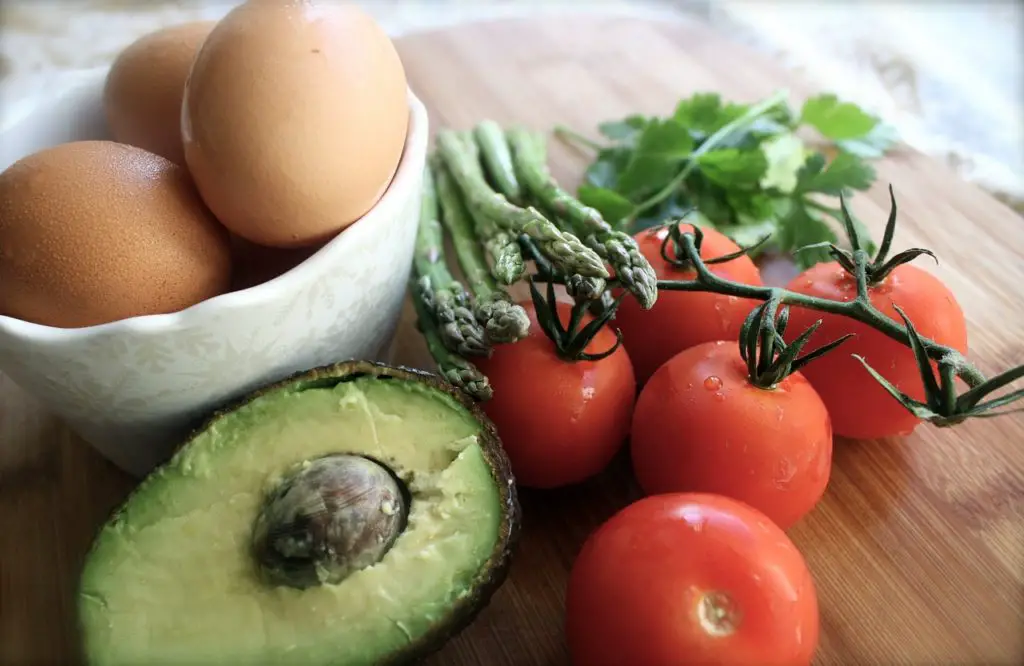
It’s not only about cutting calories. If it were, calorie restricting diets would be the magic pill for weight loss. But it’s not as simple as that.
We are humans and things like cravings, energy fluctuations and the rest hit us which in turn make us run back to eating more food, defeating the purpose of trying to lose weight.
For any diet or eating pattern to be ideal and effective for weight loss, it should at least possess these characteristics
- Allow you to consume less calories than you need to maintain your weight
- Be able to suppress hunger cravings
- Support good and steady energy levels
The ketogenic diet is a high fat, low carb diet that puts your body in a state of ketosis by restricting your carbohydrate intake. Ketosis is a metabolic state where your body breaks down fats and fatty acids into ketones to be used for energy.
In ketosis, your body uses these ketones as its primary energy source rather than glucose which is gotten from carbohydrates.
Being in ketosis has certain health benefits which can help you and make it easier to lose weight on keto. Here are certain ways the ketogenic diet and ketosis affect weight loss
Supressing hunger Cravings
Hunger cravings are the number one obstacle when it comes to losing weight and is a reason why so many dieting patterns tend to fail. You can’t lose weight when the pangs of hunger hit you every couple of minutes.
Being in ketosis helps to greatly suppress appetite, thereby making it easier for weight loss to occur.
The less you feel hungry, the less likely you are to go around looking for a snack. Some keto followers have even reported skipping some meals without noticing because they didn’t feel hungry
Good and steady energy levels
The first thing you do or think of doing when you feel drained or out of energy is eating. Energy fluctuations are common with high carb foods due to insulin spikes and crashes.
This is why insulin has been painted as a bad hormone which stores fat, meanwhile, it’s just doing its job. When glucose is high, insulin is released to maintain the blood sugar and after blood glucose levels are stabilized, insulin levels drop.
The spikes and crashes in insulin levels in relation to high carbohydrate consumption leads to energy bursts and crashes. And when energy crashes happen, we tend to turn to the same foods which caused the initial problem, leading to a cycle.
The ketogenic diet lowers and stabilizes insulin levels, preventing energy crashes. On top of that, ketones which are the primary source of fuel in ketosis are more efficient than glucose, leaving you with more energy for longer.
Consuming less calories
Another reason the ketogenic diet works well for weight loss is because it allows you consume less calories without even realising.
Unlike calorie restricted diets where you have to swap foods and watch calories, the keto diet contains highly nutritious and satiating foods that help you consume less calories without even realising.
These are few of the ways keto affects and supports weight loss. Now, how do you lose weight on keto?
What to do to lose weight on keto
For easy and efficient weight loss on the ketogenic diet, here are the main things to make sure are in place
- Be in ketosis
- Eat healthy keto-friendly foods
- Know and follow your macronutrient ratios
- Plan your meals / follow a meal plan
Be in ketosis
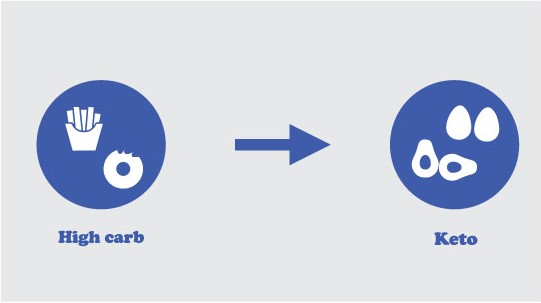
One of the first steps in losing weight with keto is to be in ketosis if you’re not in ketosis, you’re not doing keto. You’re simply doing low carb. Of course you can still get to lose weight simply going lo carb, but you’ll miss out on the extra benefits of being in ketosis which makes things easier.
Ketosis makes weight loss easier by giving you more and better energy from ketones, dealing with hunger cravings and helping you consume fewer calories. All in all, being in ketosis makes it easier for weight loss to occur on keto.
To enter ketosis, you need to limit your net carb intake to about 35g of net carbs per day. For more information on how to enter ketosis, check out our guide to entering ketosis.
Eat healthy keto foods
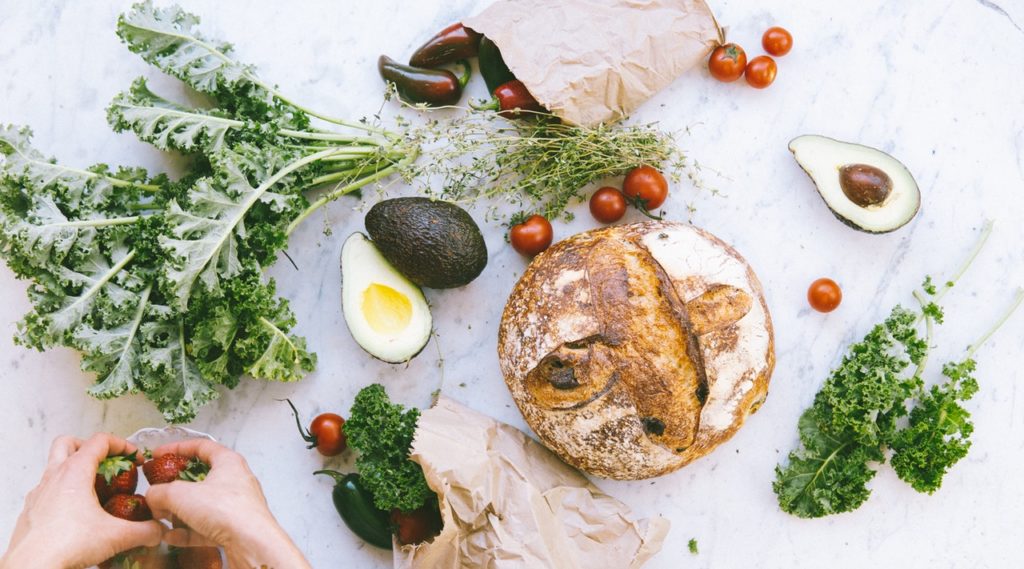
On the ketogenic diet, you get to eat healthy and highly satiating low carb foods that help keep you healthy and in shape. Leaning towards natural foods is best as they are more nutritious and healthier and would be the best for weight loss.
Generally, these are the foods to eat and avoid on the ketogenic diet
Foods to eat
- Meats
- Eggs
- Fish
- Shellfish
- Nuts and seeds
- Leafy green vegetables
- High fat dairy
- Avocados
- Healthy Fats and oils
Foods to avoid
- sugary foods – donuts, maple syrup
- grains – rice, wheat , corn
- most fruits – bananas, oranges
- root vegetables – potatoes, carrots
- low fat products
- unhealthy fats – mayonnaise
For more information on what to eat and what to avoid on keto, check out our keto diet food list.
Know and follow your macronutrient ratios
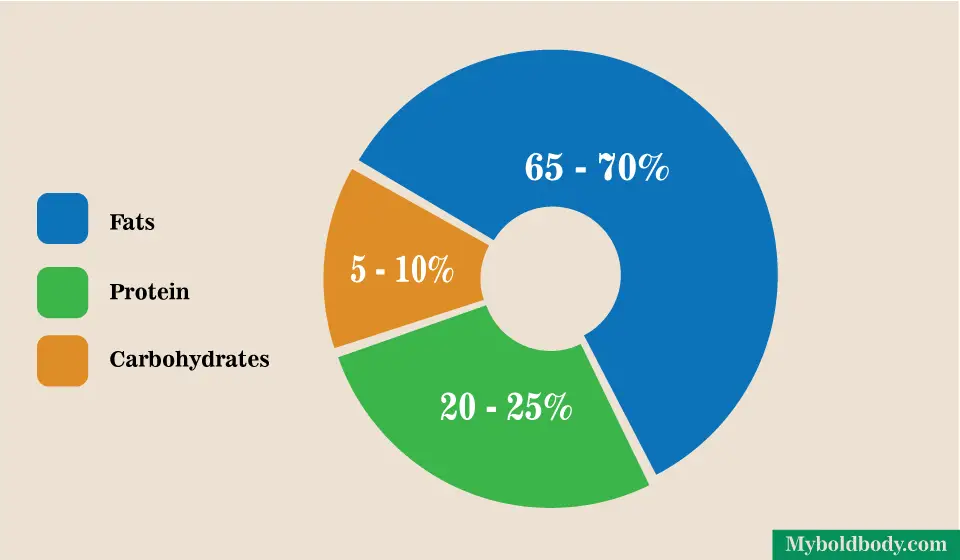
Macronutrients are nutrient required by the body in large quantities. They are carbohydrate, protein and fats. Consuming the proper amount of each macronutrient you need is essential to success on keto.
By following the macro ratios, you can enter and maintain ketosis. The macronutrient ratios for the keto diet are
- Fats – about 70%
- Protein – 20 – 25%
- Carbohydrates – 5 – 10%
These of course, are just percentages. The reason there is no fixed percentage is because individual macronutrient requirements can vary from person to person. A good way to find out your precise macronutrient requirements is by using a keto calculator.
A keto calculator shows you how much fats, carbs and protein you should be consuming based on your weight, BMI, age, activity levels and lifestyle. Knowing and following your macro ratios will help you lose or maintain weight, depending on whichever one you want.
Here is a good keto calculator you can use
Plan your meals / follow a meal plan
Planning your meals is a good way to lose weight on keto. Meal planning will help you to consume foods that will only support your weight loss goals.
Planning your meals doesn’t have to mean going military on yourself. It just means choosing the best keto friendly meals to help you lose weight.
Following a well-structured weight loss meal plan would seem to be most effective because all the heavy lifting is done for you and the meals are designed to help you lose weight.
How to preserve muscle mass while losing weight
You want to be able to burn excess fat and still retain muscles. Losing muscle mass is bad as your muscles are very important when it comes to helping your body function properly. The key to retaining muscle mass while losing weight on keto is protein.
Your protein intake determines mainly of you lose, gain or retain muscle. To retain muscle while losing weight, you need to make sure you’re eating enough protein. Basically, based on activity levels, this is how much protein you should be eating
- Sedentary: around 0.7 – 0.8g of protein per pound of lean body mass.
- Slightly active: around 0.8 – 1.0g per pound of lean body mass.
- More active: 1.0 – 1.2g per pound of lean body mass.
A more precise way to know how much protein you should be eating is by using a keto calculator which helps you determine your macronutrient intake as stated above.
How fast will you lose weight on the keto diet?
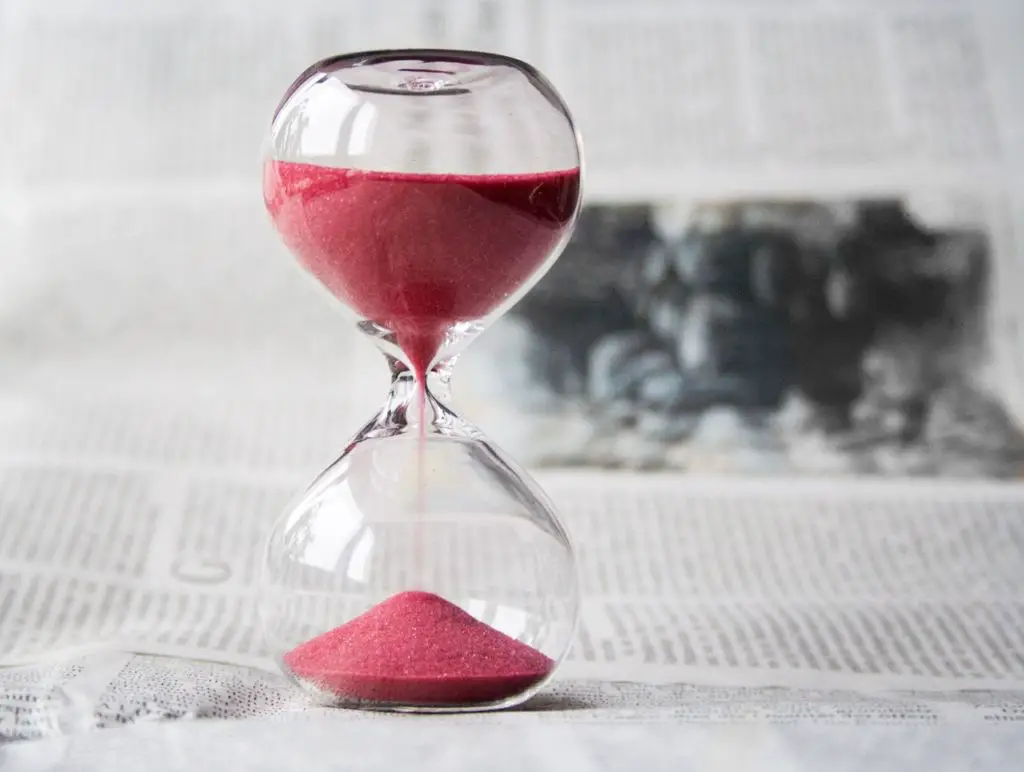
When losing weight, it is important to know how you are progressing and if your progress can be termed normal, fast or slow. On keto, you will experience 2 main phases of weight loss.
- Rapid weight loss ( water weight)
- Regular weight loss
Rapid weight loss at the beginning (water weight)
When you enter ketosis for the first time, you will initially lose a lot of weight very quickly. This happens because for your body enters ketosis for the first time, it needs to deplete its glycogen stores.
Glycogen stored in the body holds on to a lot of water molecules. When this glycogen is used up, these water molecules as well as some electrolytes are removed from the body.
This usually relates to a huge and most times, significant drop in the scale pretty quick.
This rapid water loss can leave you feeling dehydrated and a little weak at times, so it’s important to drink water and replenish electrolytes. Find out more in our keto flu guide
After losing the water weight and becoming keto adapted, you begin to lose weight at a more regular rate
Regular weight loss
Once you’re in ketosis and have lost the water weight, you’ll begin to drop pounds at a steadier rate. Usually, this translates to about 1 – 2 pounds per week. The less weight you have to lose, the slower you’ll drop pounds.
But if you have a lot of weight to lose, you can expect to see higher numbers drop off the scale even after entering ketosis and losing water weight.
Basically, the more weight you have to lose, the faster you’ll lose it and the less weight you have to lose, the slower you’ll lose it. A normal rate for losing weight is around 1 – 2 pounds per week
Factors affecting how you lose weight on keto
Even though there are rates at which weight loss is meant to occur, certain factors may slow or speed them up. It’s important to know these factors and know how they affect you.
Some of these factors are out of our control and we can’t do anything about them. Some of these factors are also within our control and we can change them if we want to see better results.
- Your BMR – BMR means basal metabolic rate. It is the amount of energy or calories your body needs to sustain its normal function. This is out of your control and may vary across many of the other factors
- Age – as you get older, you may find it a little bit less easy to shed excess fat. a good example of this is menopause. Women approaching or already in menopause may not lose weight as easily as younger women.
- Weight / BMI – as said earlier, the more excess fat you have, the faster you’ll be able to lose it. Alternatively, the less excess fat you have, the slower you will lose it.
- Health conditions – certain health conditions like thyroid-related issues, certain hormonal imbalances and metabolic issues can all affect weight loss. Some of these issues can be resolved
These above factors are seemingly out of our control. Others however are within our control like
- Your calorie deficit – you cannot control your BMR, but you can control your calorie deficit. That is, the amount of fewer calories you need to lose weight.
- Daily habits – this goes from frequency of snacking to frequency of exercise to cheat days. These are all within your control and can determine how well you see results
Keto weight loss plateaus – reasons you’re not losing weight and how to solve them
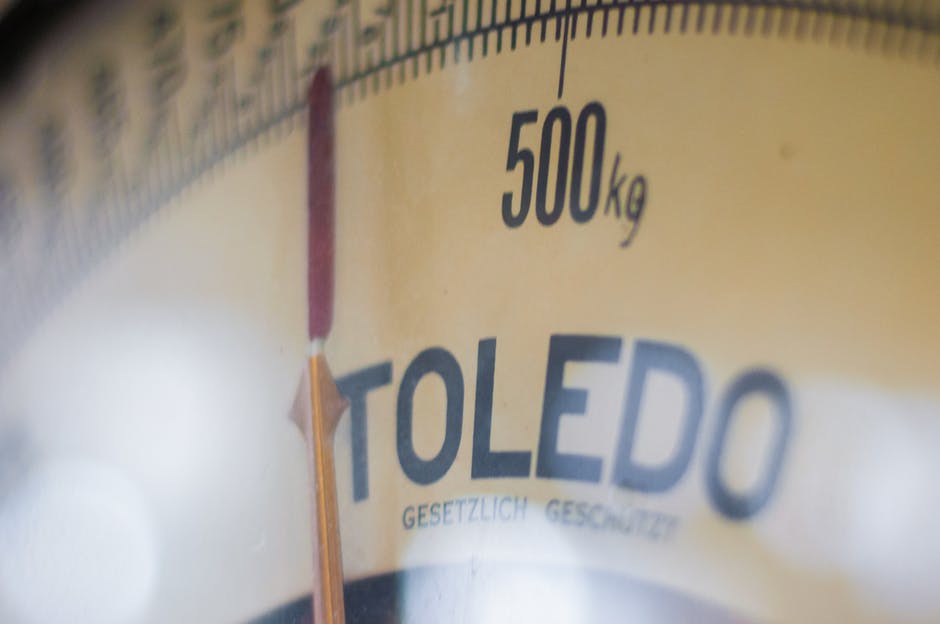
There are certain things that could be sabotaging your weight loss efforts on the ketogenic diet. Knowing and dealings with these things will definitely bring about positive change if they affect you.
These are some of the reasons you might not be losing weight on the keto diet, and how you can solve them
Too much carbs
On the ketogenic diet, you need to be able to achieve and maintain the state of ketosis. Consuming too much carbs will kick you off ketosis and as you’ve learnt, ketosis makes weight loss easier.
It is recommended to reduce net carb intake to around 35g of net carbs per day. Consuming too much carbs may also not be intentional. Some foods contain hidden carbs which can add up to your total carb count for the day and affect ketosis.
How to solve it – ensure to track your daily carb intake. A good way to do that is by using a tracking app like MyFitnessPal to know the carb content of what you consume. You can also track your total daily and weekly carb intake by using our free carb tracker
It’s also important to watch out for hidden carbs and eliminate them if possible. A lot of processed foods termed “low carb” today contain hidden carbs so it’s important to watch out for them. It’s generally better to stick to the natural whole versions of these foods.
You’re eating foods you’re sensitive to
Food allergies and sensitivities can affect and sabotage your weight loss efforts. If your body is sensitive or allergic to a particular food, eating it will cause problems and no doubt slow down your progress.
You don’t need to force yourself to eat a particular food just because its termed keto friendly. If you have allergies or sensitivities to a particular food, then it would be best to avoid it.
How to solve it – The keto diet has hundreds of keto friendly foods. If your body doesn’t like a particular one, try other keto friendly alternatives. You can see a whole list of keto friendly foods in our food list.
Our free meal planner also allows you note down the foods and meals that caused allergies or sensitivities so you can best avoid them and focus on the ones that make you feel great.
Too many calories
This is pretty obvious. If you consume more calories than you need to maintain your weight, you will gain weight for sure. Even though the ketogenic diet foods are generally satiating and therefore makes you consume less calories without noticing, it’s still possible to go overboard.
How to solve it – it’s important not to overdo it. You are not likely to run into problems if you follow a good diet plan. Here is a good meal plan we recommend for weight loss on keto.
If you want to track calories, you can also do so with the help of apps like MyFitnessPal. The key to healthy weight loss is maintaining a good calorie deficit
Excessive snacking
Snacks are great, but too much of everything isn’t a good idea. Snacks contain calories as well and they also have their own carb counts. Excessive snacking can nullify your calorie deficit, as well as add to your carb count and affect ketosis.
This doesn’t mean snacks are bad, just that too much of them can affect keto weight loss
How to solve it – try to cut out or reduce the rate of snacking. If you have to enjoy snacks, go for low calorie and low carb snacks that still fit into your weight loss goals. If the snacks don’t fit into your fat loss goals, it would be best to cut them out for now.
Cheating and inconsistency
Cheat days can be fun, but won’t get you far in terms of getting the results you want. Cheat days are not ideal when trying to lose weight on keto. Also, if you are always on and off on keto, you won’t be able to see the results you desire.
How to solve it – try to be consistent. Consistency is key. If you are falling off keto for a particular reason, try to identify it and fix it. If you engage in cheat days, it would be best to avoid them till you’ve gotten to your desired weight.
Stress and lack of sleep
Ketosis and stress are two factors that never agree. Stress makes your body produce more of a hormone, cortisol which can reduce ketone production.
Also, stress and lack of sleep have constantly been linked to weight gain. So getting excessively stressed and deprived of sleep can affect your results on the keto diet.
How to solve it – ensure to get adequate sleep, no matter what. A good way to manage stress is through yoga, meditation or even just listening to music. Proper stress management and adequate sleep will help for easier weight loss.
For more reasons as to why you may not be losing weight on keto and detailed steps on solve them, check out our guide on keto plateaus
Extra tips to maximize weight loss

- Increase physical activity – increasing your activity levels like engaging in exercise can help to burn off extra calories which can lead to fat loss. cycling, running or weight lifting are good ideas depending on what you like
- Focus on real whole foods – natural whole foods are the best. They are more nutritious, healthier and contain less carbs than their processed counterparts
- Try intermittent fasting (IF) – intermittent fasting can help boost fat loss and break through a weight loss plateau. It involves eating during specific time windows of the day. For more information, check out our guide on intermittent fasting.
- Take MCTs – MCTs stand for medium chain triglycerides and they go straight to the liver when eaten to be broken down into ketones. MCTs help supress appetite and increase energy levels
- Eat adequate protein – protein also has appetite suppression abilities. Too little protein will make you lose muscle mass which is bad and too much might affect ketone production. It’s best to eat the right amount as shown previously.
How to track your progress
It’s important to track your progress and also to do it properly. Certain markers night not be the best when estimating progress. For example, of you lose weight and gain muscle, you might not notice the change on the scale even though you’ve made progress.
Here are some ways to track your progress
- The scale – the scale is a more general way to check how much weight you’ve lost, but not the most accurate. Like I said above, the scale only measures difference in total weight, and not specifically fat loss. even at that, it can still be of help to you
- Waist circumference – this is a more accurate way of measuring fat loss. It involves wrapping a measuring tape around your waist, exhaling and taking measurements. Check out this guide on measuring your waist circumference
Summing it all up – how to lose weight on keto
Here is the quick summary of what to do to lose weight on the ketogenic diet
- Be in ketosis
- Eat good and healthy keto friendly food
- Know and follow your macronutrient ratios
- Plan your meals or follow a well-structured meal plan
- Eat adequate protein to prevent muscle loss
- Stay consistent (no cheating)
- Engage in physical activity
- Try intermittent fasting
- Watch out for hidden carbs
- Focus on natural whole foods
- Don’t eat foods you’re allergic or sensitive to
- Reduce stress and get enough sleep
- Take MCTs
- Track your progress
For more on how to succeed on the keto diet, check out our free keto resources and our keto diet recommendations to help you achieve the results you want on keto easily and efficiently.
If you enjoyed this, feel free to share it with your friends and follow us on social media for more amazing keto guides
References
- Ketones, more efficient source of energy – NCBI
- Effect of ketones on mitochondrial function – sciencedirect
- The Effects of a Low-Carbohydrate Diet on Appetite – NCBI
- Effects of a low carbohydrate diet on energy expenditure during weight loss maintenance – the BMJ
- Men lose weight faster than women – webmd
- Reasons you’re not losing weight on keto – Healthline
- Successful treatment of obesity and insulin resistance via the keto diet – NCBI
- Rate of weight loss predicted by patient’s characteristics – NCBI
